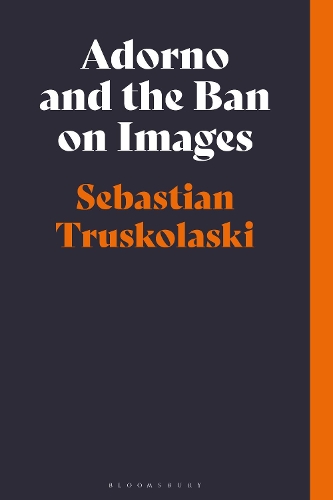
Adorno and the Ban on Images
(Paperback)
Available Formats
Publishing Details
Adorno and the Ban on Images
By (Author) Sebastian Truskolaski
Bloomsbury Publishing PLC
Bloomsbury Academic
28th July 2022
United Kingdom
Classifications
Tertiary Education
Non Fiction
193
Physical Properties
Paperback
232
Width 154mm, Height 232mm, Spine 16mm
320g
Description
This book upends some of the myths that have come to surround the work of the philosopher Theodor W. Adorno not least amongst them, his supposed fatalism. Sebastian Truskolaski argues that Adornos writings allow us to address what is arguably the central challenge of modern philosophy: how to picture a world beyond suffering and injustice without, at the same time, betraying its vital impulse. By re-appraising Adornos writings on politics, philosophy, and art, this book reconstructs this notoriously difficult authors overall project from a radically new perspective (Adornos famous standpoint of redemption), and brings his central concerns to bear on the problems of today. On the one hand, this means reading Adorno alongside his principal interlocutors (including Kant, Marx and Benjamin). On the other hand, it means asking how his secular brand of social criticism can serve to safeguard the image of a better world above all, when the invocation of this image occurs alongside Adornos recurrent reference to the Old Testament ban on making images of God. By reading Adorno in this iconoclastic way, Adorno and the Ban on Images contributes to current debates about Utopia that have come to define political visions across the political spectrum.
Reviews
This is a breathtaking exploration of one of the most evocative and undertheorized themes in Adornos oeuvre. In this searching, lucid and dazzlingly original study, Sebastian Truskolaski manages to achieve what no-one has even attempted. He extricates the ban on images from religious pieties and from platitudes about the inexpressible-unimaginable-unspeakable, and demonstrates compellingly that this rigorously disenchanted figure lies at the heart of Adornos peculiar materialism and is the key to its radical utopian promise. This is a new, exciting reading of Adorno that will also transform the way we think about art and politics today. * Rebecca Comay, Professor of Philosophy and Comparative Literature, University of Toronto, Canada *
In this exciting new book, Sebastian Truskolaski unpacks the ban on images around which he argues Adornos thinking is organized. Far from miring us in an abyss of despair, as Truskolaski presents it, the Adornian Bilderverbot not only offers considerable resources for challenging the status quo, but an incipient method for thinking our escape. * Cat Moir, Senior Lecturer and Chair of Germanic Studies, University of Sydney, Australia *
Adorno and the Ban on Images admirably articulates the significance of Adornos reworking of the Old Testament ban on images in a variety of contexts, ranging from the musicological to the literary, and from the epistemological to the historical. Through strategic imbrication of meticulous scholarship, sober theoretical vigilance, and critical inventivenessqualities that are increasingly rare to findTruskolaski convincingly illuminates a central concern of Adornos notoriously refractory thinking. * Gerhard Richter, University Professor of Comparative Literature and German Studies, Brown University, USA *
The most interesting dimension of Truskolaskis book is its forceful evocation of a political orientation in Adornos thought through an explication of the image ban ... His work will be useful not only to those who work on Adorno and the Frankfurt School more generally, but also to anyone with an interest in the theoretical and practical challenges facing the struggle toward a world free of exploitation. * Marx and Philosophy Review of Books *
Author Bio
Sebastian Truskolaski is Lecturer in German and Comparative Literature at Kings College London, UK. His research focuses on the relationship between modern and contemporary art, literature and philosophy.
